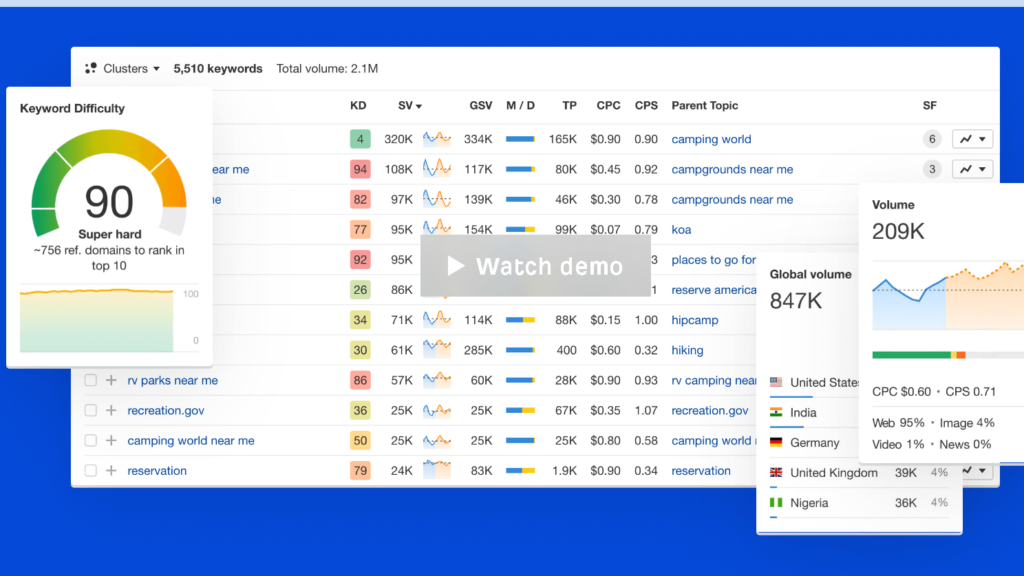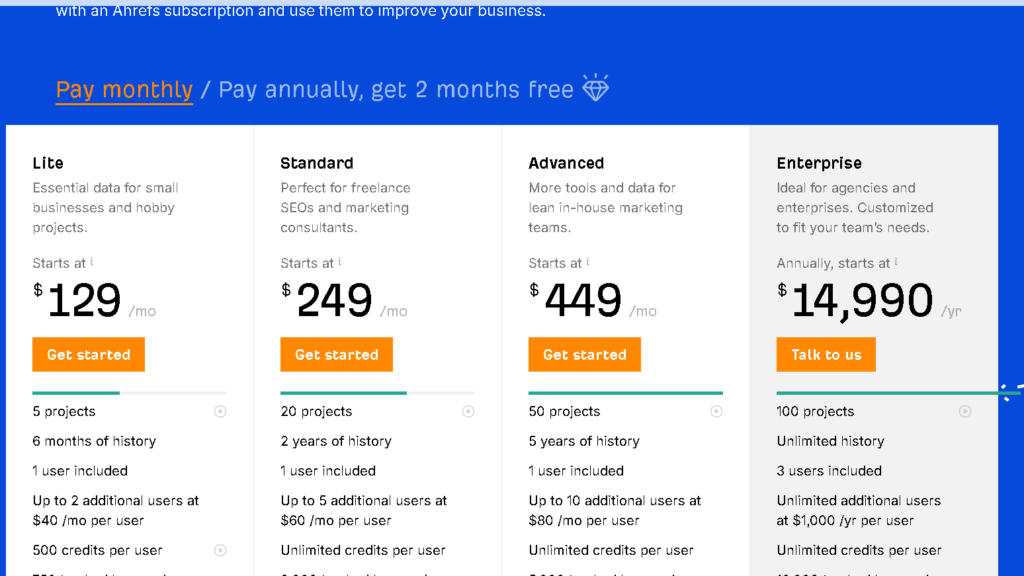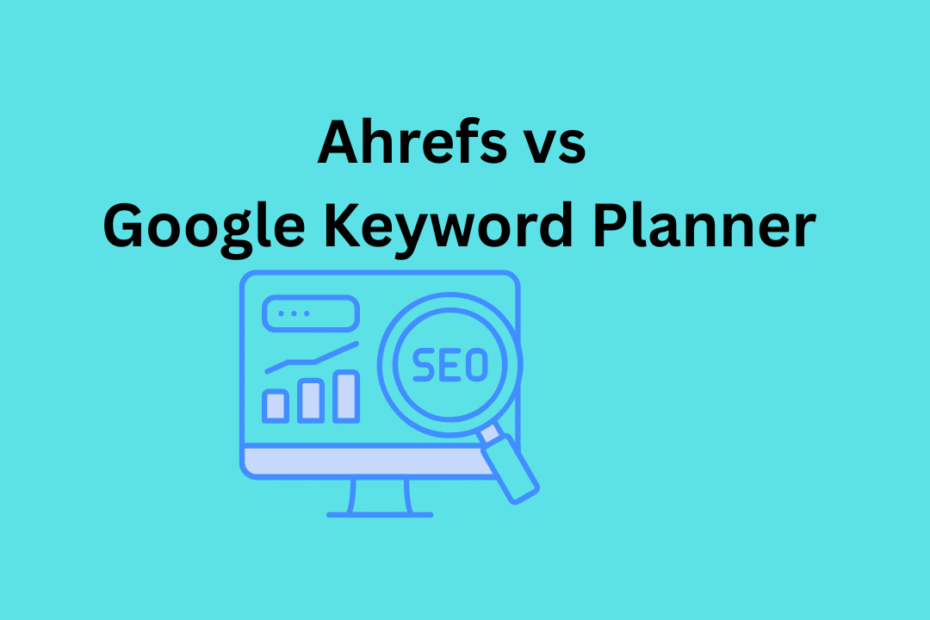Picking between Ahrefs vs Google Keyword Planner somewhat depends on what you actually need. Ahrefs seems to give deep SEO data, like backlink checks and organic keyword clues, but it also costs a lot, so small teams might skip it. Google Keyword Planner, on the other hand, offers simple volume numbers and competition stats straight from Google, which is good for ad budgets that are tight. Some users may prefer Ahrefs for its detailed difficulty scores, competitor info, and site health views. Others, especially beginners, might stick with the free planner because it’s easy and fits paid‑search plans. So, understanding these trade‑offs could save time and lead you to the right tool for the job. Perhaps mixing both tools may help.
Core Differences Between Ahrefs and Google Keyword Planner

As for keyword research, Ahrefs and Google Keyword Planner may seem like they’re doing the same thing, but they couldn’t be more different. Coming from different backgrounds, they have unique features, cater to different users and tap into different sets of data. All of which affect how well they can help with SEO and paid advertising.
Overview of Features
If you’re looking for SEO analysis, Ahrefs has got the whole package. It can tell you about the backlinks to your site, the keywords your competitors are targeting and the ranking difficulty of your own. Coming from a different direction, Google Keyword Planner is basically an advertising tool. It is great for keyword ideas, search volume and competitor analysis, and also has a neat feature for budget forecasting.
Well-known for its wealth of SEO-related insights for website owners, Ahrefs goes in-depth into the organic traffic, the strength of a website’s backlinks and the ranking of its keywords. Google Keyword Planner is great for keyword ideas, estimated search volumes and competition data for Google Ads campaigns. It’s also got the ability to give you suggested keywords that are tailor-made for pay-per-click ads.
Ahrefs requires a subscription. Google Keyword Planner is free. Just sign up for a Google Ads account.
Intended Users and Use Cases
In relation to SEO and keyword research, Ahrefs is more for the professionals. SEO specialists, marketers and agencies who need really in-depth insights. This tool can handle organic search strategies, content planning and competitor analysis. Coming hotfooting off the heels of Ahrefs, Google Keyword Planner is the go-to tool for advertisers running PPC campaigns, It is perfect for small businesses and beginners who want to run basic keyword research and ad budget planning.
Well-known, Ahrefs is for those who want to kickstart organic SEO growth. Google Keyword Planner is for those who are concentrating on paid search campaigns.
Data Sources and Accuracy
If you’re looking for keyword volume data, Ahrefs pulls in part from the Google Keyword Planner, but kicks it up a notch with real-time clickstream and its own web scraping. Coming hotfooting straight from the horse’s mouth, Google Keyword Planner is a bit different. Its estimates of search volume and competition are accurate for PPC ads. It is not suitable for organic SEO analysis, especially for niche or long-tail keywords, basically because they don’t go into much detail.
Ahrefs is the better option for those looking for an SEO analysis. Google Keyword Planner provides clean-cut, straightforward metrics that are perfectly for paid ad campaigns.
SpyFu vs Semrush vs Ahrefs vs Moz: Which SEO Tool?

Keyword Research Capabilities
Regarding keyword research, Ahrefs and Google Keyword Planner are two of the most popular tools, but they go about it in different ways. The methods they use to find keywords, the accuracy of the results and the level of competitive analysis provided set them apart.
Keyword Discovery Methods
Concerning keyword research, Ahrefs and Google Keyword Planner are two different tools that provide a wealth of data.
Ahrefs uses its massive web crawler to dig up a plethora of keyword data, and pulls in a large portion of search volume, click data, and organic keyword metrics, which can give you a rock-solid understanding of long-tail and niche keywords. Coming from a different direction, Google Keyword Planner, works mainly with the Google Ads database, focusing on keywords that are relevant to pay-per-click campaigns. It throws out rough estimates of search volume for broad-based keywords, which makes it good for launching paid ad campaigns but doesn’t offer a lot of precision for organic SEO.
One area where the two tools do have a feature in common is the ability to take a seed keyword and spit out related terms. However, Ahrefs takes this a step further with its filtering features and advanced information which makes for an even finer-tuned search.
Keyword Suggestions Quality
Concerning keyword suggestions, Ahrefs stands out with its comprehensive analysis of related questions, search phrases and metrics like keyword difficulty and clicks. This allows marketers to accurately assess the effort it will take to rank for a particular keyword and the potential traffic that it can generate.
Google Keyword Planner, on the other hand, is based on Google search data but gives less detailed information. Its suggestions don’t come with any keyword metrics, but stresses on search volume and competition scores, which is better suited for planning and bidding for ads.
Overall, Ahrefs’ suggestions prove to be more useful for organic search.
Competitive Analysis Tools
When discussing analyzing competitors, Ahrefs offers something that Google Keyword Planner doesn’t. A comprehensive breakdown of which keywords your competitors are ranking for and the backlinks that power their rankings. You can track the keyword positions of your competitors over time and spot areas where your SEO strategy can be improved.
Google Keyword Planner is a very different story and provides some rough competitive metrics, useful primarily for PPC, things like bid estimates and the competition level. Coming from an SEO standpoint, it’s lacking in analysis of competitor’s performance.
Coming from an SEO perspective, Ahrefs has much more to offer, especially if you want to know how your competitors are performing in the organic rankings. The tool is mainly used to serve up richer insights and Google Keyword Planner is best used by those running paid search campaigns.
Search Volume and Keyword Metrics Comparison
For keyword data and the quality of insights into search volume and difficulty, SEO and paid campaigns can’t function without them. Well-known tools in the SEO world vary in the way they present these metrics, for instance, search volume estimates, difficulty scores and click-through and impression numbers. Knowing how these different tools work can be the difference in choosing the right tool for a particular marketing objective.
Search Volume Accuracy
Speaking of search volume data, Google Keyword Planner and Ahrefs are two of the most famous tools.
Google Keyword Planner gets its search volume directly from Google Ads, showing us ranges of numbers rather than exact figures, primarily for the purpose of paid advertising.
Ahrefs takes a different approach, combining Google data with clickstream and other sources, and gives us monthly updated, much more detailed trends. But Ahrefs’ volume estimates can vary, roughly accurate for about sixty percent of the time.
Google Keyword Planner gives us much broader volume ranges, while Ahrefs delivers more refined, yet approximate, figures.
Keyword Difficulty Measurement
Concerning ranking in organic search, knowing the keyword difficulty is key, and Ahrefs provides a great metric for this. They use a keyword difficulty score, which is based on the strength of the top-ranking pages. It takes into account backlinks and other SEO factors to estimate the competition intensity. Also, it gives a detailed score that’s useful for organic keyword targeting, but is not found in Google Keyword Planner.
Google Keyword Planner, on the other hand, has no keyword difficulty score and instead uses competition metric based on advertiser demand. This has absolutely no correlation with SEO difficulty and is just useful for bidding strategies in the world of Adwords.
Click and Impression Data
Understanding the difference between clicks and impressions can add a new dimension to the analysis, when evaluating the performance of your keywords.
Ahrefs helps here by including click data in its metrics and estimating the number of clicks a keyword receives, all the while taking into account the effect of ads and other variables.
This makes it a great tool to predict the organic traffic that a keyword can possibly generate and assists in planning content, and ranking strategies.
On the other hand, Google Keyword Planner’s main emphasis is on impressions and clicks that are related to ads, rather than organic clicks. It supplies expected impressions and average cost-per-click for payed campaigns. It doesn’t help SEO experts looking for organic traffic.

SEO Strategy and Campaign Support
In the case of SEO, using the right keywords and watching how they’re performing over time are the building blocks of any successful SEO campaign. Building a complete list of keywords and monitoring how they rank in search engines are the two main components of this process.
Building Keyword Lists
In terms of building a comprehensive keyword list, Ahrefs is the go-to tool. Coming hotfooting off the heels of any search, it gives you the exact search volume, the difficulty level of a keyword and loads of suggestions for other related words, all based on its massive web database.
Marketers will love being able to see not only popular keywords but also niche terms that are less competitive, and Ahrefs has a feature that shows you the questions that people ask, which is basically a never-ending source of ideas for SEO content.
Google Keyword Planner is helping you to build keyword lists. It provides search volume estimates and competition levels for Google Ads campaigns. It’s not as detailed as Ahrefs, but it’s perfect for anyone who’s just starting out or focuses on paid search, and because it integrates so well with Google Ads, makes it easy to match keywords to ad campaigns.
Both tools allow you to export your keyword lists, but differ in what they specialise in. Ahrefs is all over organic SEO. Google Keyword Planner on the other hand is going towards paid advertising.
Tracking Keyword Performance
When evaluating the effectiveness of SEO strategies it’s essential to monitor the position of your target keywords in the search results. Ahrefs offers a feature to track the rise and fall of your keywords over time and across various search engines. Coming with a wealth of historical data, alerts to changes in rankings and even comparison with the keyword strategies of your competitors, Ahrefs gives you the real performance data you need to refine your marketing plans.
Google Keyword Planner is not able to provide keyword rankings as it is primarily concerned with forecasting ad performance and working out the costs of your PPC campaigns. Organic SEO work is much better done in conjunction with Google Search Console, which gives you a clear picture of your organic search traffic and rankings.
If you are running SEO campaigns that aim for organic visibility, Ahrefs will be the way to go, while Google Keyword Planner is better suited to getting the picture of what’s going to be working well with paid campaigns.
Semrush vs Ahrefs vs Ubersuggest: Which SEO Tool is Best?
Backlink and Competitor Insights
Understanding backlinks and your competitors is basically crucial, when it came to search engine optimization (SEO). Well-known tools for this include detailed link profile analysis and benchmarking, which enable you to see exactly how you stack up against the competition.
Backlink Analysis Features
Ahrefs is the way to go, when analyzing backlinks to a website. Coming hotfooting out of nowhere with its massive backlink database, it gives you the lowdown on the quality, quantity and origin of links to your site. You can see exactly what referring domains, anchor texts and new and lost links have been, all in one go, and that lets you zero in on the good links that are boosting your site and weeding out the low-quality ones that are sending you backwards.
Well-known Google Keyword Planner doesn’t even have backlink analysis capabilities, and although Moz and Semrush are also in the same boat, Ahrefs is consistently getting rave reviews for its accuracy and thoroughness. With Ahrefs’ reports, you get the data you need to create a link-building plan, and also spot any missed opportunities.
Competitor Benchmarking
When monitoring your competition, Ahrefs gives you a chance to see how your fellow websites are faring in the world of search, by comparing your website’s traffic, keyword rankings and backlinks with those of your competitors, and shows you which keywords they’re ranking for and where their backlinks come from.
Coming hotfooting from a keyword-based angle, Google Keyword Planner is a good tool, but doesn’t offer much in the way of competitor analysis, Moz and Semrush do have this feature but to different degrees. Ahrefs brings all the competitor insights together with backlink analysis, making it much simpler to figure out how you can knock your competition out of the top spots in your niche. Seeing how your competition has been performing over time will also let you refine your SEO plan, giving you a massive edge.
Integration and Workflow Considerations
Understanding how each tool is integrated with existing marketing workflows is key to making a decision, when deciding between Ahrefs and Google Keyword Planner. Integration with tools such as Google Ads and Google Search Console can be influenced by the ease of use of these tools, which, in the case of Google Keyword Planner is, is quite high.
Integration With Other Tools
When it comes to working with SEO platforms and marketing tools, Ahrefs is quite the go-to, and its integration with Google Search Console is basically seamless, allowing you to import site data to monitor organic performance, and merge it with backlink profiles to get a more in-depth view of your site’s performance.
Google Keyword Planner is, as you’d expect, tightly linked to Google Ads, since it’s part of that system, but doesn’t have a direct connection to other SEO tools or sources of backlinks. Well-known as it is, neither tool is capable of nipping out to Google Trends, but most users are accustomed to exporting data separately to see shifts in search demand over time.
Ahrefs is more versatile for users who need to juggle multiple platforms in one place, whereas Keyword Planner takes the lead in PPC-focused workloads.
Ease of Use and Accessibility
Google Keyword Planner is simple. The interface is easy to understand and easily understand, showing the number of searches, competition, bid estimates. While you may have little knowledge of SEO and some experience with ads with Google Ads, it will be easily available for beginners.
Ahrefs is, but, more complex and it is more prone to learning. Its data-rich dashboard can be a headache for novices who will take several hours to master site explorer, backlinking tools and keyword difficulty. But, it provides extensive tutorials and support for improving over time.
Google Keyword Planner is free, but requires Google Ads account. Ahrefs is a subscription-based model that could be limited by smaller businesses, but provides more useful information for serious SEO.
Pricing, Limitations, and Suitability

Ahrefs vs Google Keyword Planner are considerably more pricey and features and consumer focused. One plans to offer large paid plans with detailed SEO tools but the other offers free access and limited data depth. Their suitedness depends on the user’s goals and budget.
Free vs Paid Features
Google Keyword Planner is free, but requires a Google Ads account. It provides a basic volume of keywords, competition and bid estimates for PPC campaigns. The information is straightforward but not detailed enough for advanced SEO, particularly in organic keyword targeting.
Ahrefs offers subscription service plan prices from $29 to over $400 a month. It provides detailed keyword analysis, backlink monitoring, rank monitoring and competitor insight. But, Ahrefs provides paid features such as historical information and large keyword databases, which are not found in free tools.
While Google Keyword Planner provides information for PPC keywords, Ahrefs also fits those who require more thorough SEO research and site analysis. It is cost that these services differ in depth.
Best for Different User Types
Most useful to small businesses and novices starting to start implementing and managing the Google Ads campaigns is Google Keyword Planner. It has user-friendly interface that can accommodate those that need quick keyword ideas and don’t want to learn complex SEO tools.
Ahrefs is better for SEO professionals, digital marketers, and agencies as it has a higher learning curve and costs. It provides organic search strategies and competitor research much much as it does for users seeking to maximize web traffic while tracking their own growth strategy.
Many users with low budgets would first start with Google Keyword Planner, but are frequently moved to Ahrefs when looking for advanced data and insights for content and SEO strategy.
Ahrefs vs Google Keyword Planner-FAQs
How do Ahrefs and Google Keyword Planner differ in their cost models?
The Ahrefs service is a subscription and includes multiple plans, with varying paid plans that increase in price as features and usage limits grow. It has a limited free version too.
Since the user of Google Ads is a registered user, it’s free to use if one has an account with the Google Ads network.
What are the key differences between Ahrefs and Google Keyword Planner in terms of features?
Ahrefs provides a wide variety of SEO tools including backlink analysis, competitor research, keyword difficulty scoring, and rank tracking.
Google Keyword Planner is primarily focused on keywords ideas, searches, competition, and ad cost forecasts for PPC campaigns.
Can I access keyword data via an API with Ahrefs and Google Keyword Planner?
Ahrefs provides API access for users who are logged in on certain plans, thus enabling automatic retrieval of SEO data.
Google Keyword Planner does not provide API access for keyword data but Google Ads API can interact with campaign metric.
How do the keyword traffic estimations from Ahrefs compare with those from Google Keyword Planner?
A mixture of Google Keyword Planner data with an additional clickstream data is used to provide detailed and updated traffic estimates at Ahrefs.
Google Keyword Planner can provide search volume data directly from the engine but tends to yield larger, slightly more general numbers.

